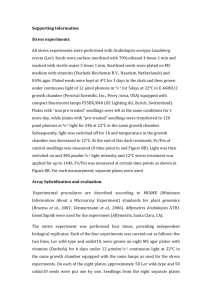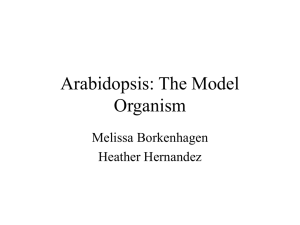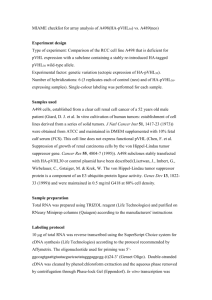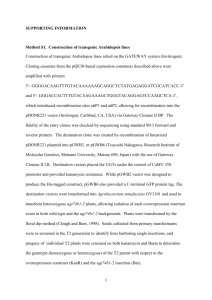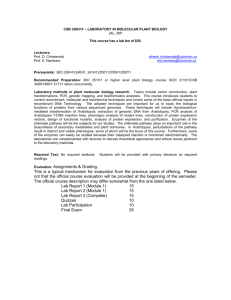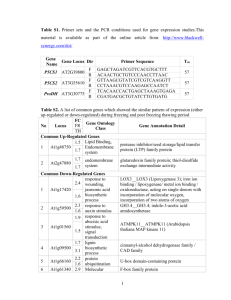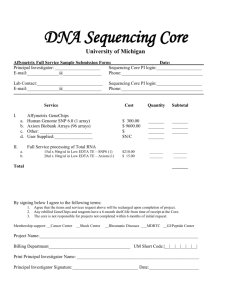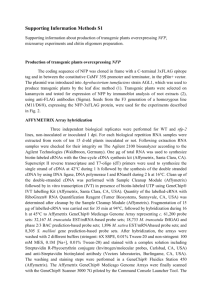file - BioMed Central
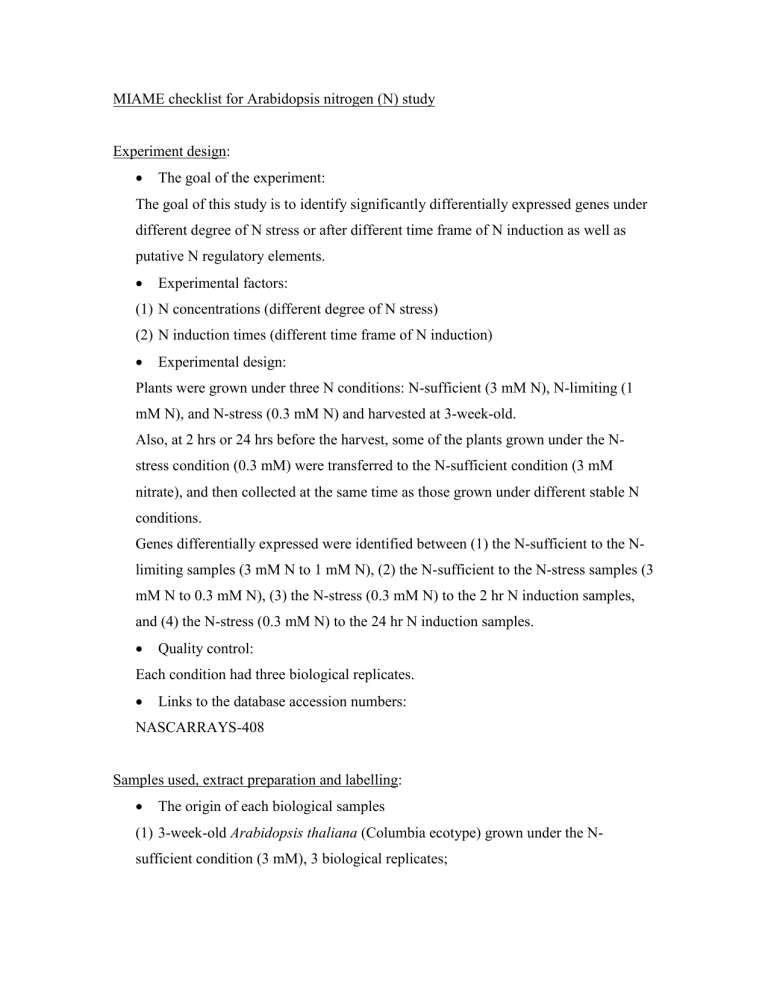
MIAME checklist for Arabidopsis nitrogen (N) study
Experiment design:
The goal of the experiment:
The goal of this study is to identify significantly differentially expressed genes under different degree of N stress or after different time frame of N induction as well as putative N regulatory elements.
Experimental factors:
(1) N concentrations (different degree of N stress)
(2) N induction times (different time frame of N induction)
Experimental design:
Plants were grown under three N conditions: N-sufficient (3 mM N), N-limiting (1 mM N), and N-stress (0.3 mM N) and harvested at 3-week-old.
Also, at 2 hrs or 24 hrs before the harvest, some of the plants grown under the Nstress condition (0.3 mM) were transferred to the N-sufficient condition (3 mM nitrate), and then collected at the same time as those grown under different stable N conditions.
Genes differentially expressed were identified between (1) the N-sufficient to the Nlimiting samples (3 mM N to 1 mM N), (2) the N-sufficient to the N-stress samples (3 mM N to 0.3 mM N), (3) the N-stress (0.3 mM N) to the 2 hr N induction samples, and (4) the N-stress (0.3 mM N) to the 24 hr N induction samples.
Quality control:
Each condition had three biological replicates.
Links to the database accession numbers:
NASCARRAYS-408
Samples used, extract preparation and labelling:
The origin of each biological samples
(1) 3-week-old Arabidopsis thaliana (Columbia ecotype) grown under the Nsufficient condition (3 mM), 3 biological replicates;
(2) 3-week-old Arabidopsis thaliana (Columbia ecotype) grown under the N-limiting condition (1 mM), 3 biological replicates;
(3) 3-week-old Arabidopsis thaliana (Columbia ecotype) grown under the N-stress condition (0.3 mM), 3 biological replicates;
(4) 3-week-old Arabidopsis thaliana (Columbia ecotype) grown under the N-stress condition (0.3 mM) transferred to the N-sufficient condition (3 mM nitrate) for 2 hrs,
3 biological replicates;
(5) 3-week-old Arabidopsis thaliana (Columbia ecotype) grown under the N-stress condition (0.3 mM) transferred to the N-sufficient condition (3 mM nitrate) for 24 hrs, 3 biological replicates.
Protocol for preparing the hybridization extract:
Total RNA was extracted using RNAwiz (Ambion), following manufacturers’ specifications.
Labeling protocols: labels used:
- name (Biotin Labelled cRNA using Affymetrix Enzo Kit)
- amount labelled (100 ug)
- label method (In-vitro transcription method)
Hybridization procedures and parameters:
- name (Affymetrix Antibody Amplification Protocol)
- solution (Buffer: EDTA, NaCl, Tween20 according to Affymetrix protocol)
- blocking agent (Herring Sperm DNA (Promega) -> 100pg/ml.
Acetylated BSA (Sigma-Aldrich) -> 0.1mg/ml)
- washing procedure
- amount used (12.5 microgram Fragmented cRNA)
- time (16 hours)
- concentration (50 pg/ml)
- volume (120 ul)
- temperature (42
0
C)
Measurement data and specifications:
(1) scanning protocol
- name (Affymetrix MAS 5.0 Standard Scanning)
- scanner name (Affymetrix Scanner 3000)
- software name (Affymetrix GCOS)
- other details such as width, height, laserpower.
(2) image analysis protocol
- name (Affymetrix MAS 5.0 Standard Image Analysis)
- sofware name (Affymetrix GCOS)
Array design:
- array type name (Affymetrix GeneChip oligonucleotide probe arrays)
- array type platform (in situ)
- array design name (Syngenta sySYNG002a Arabidopsis Genome Exon Array)
- array design source (Affymetix)
- array design element type (Synthetic oligo-nucleotides)
- array design stranded (single)
